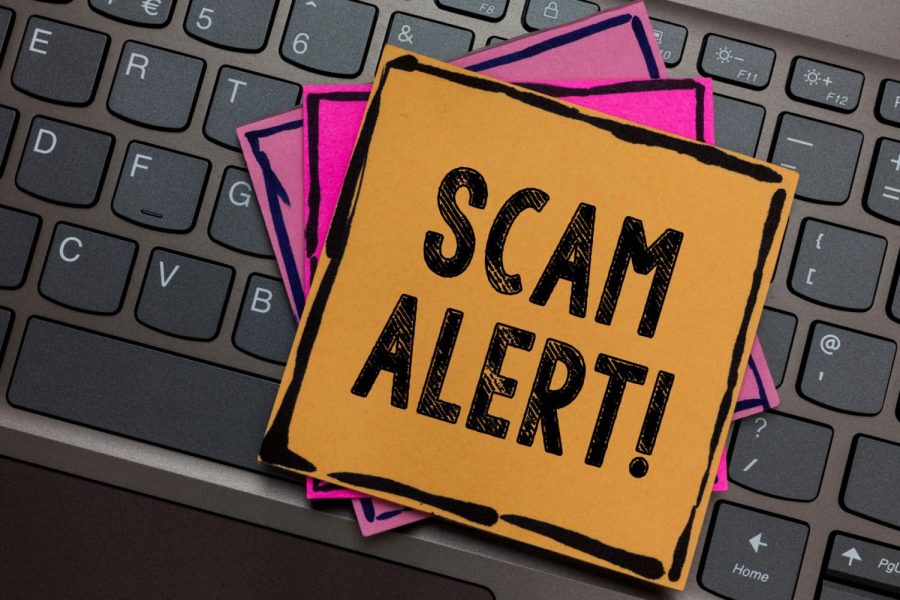Attorney General warns of scams about COVID-19
Getty Images
Attorneys general are seeing reports on a variety of scams related to the COVID-19 pandemic. Illinois Attorney General Kwame Raoul urges residents to be on the lookout for these types of scams.
March 30, 2020
DeKALB — Illinois Attorney General Kwame Raoul is urging Illinois residents to be wary of scams related to the COVID-19 pandemic.
Amid the outbreak, attorneys general across the country have been receiving reports about a variety of scams from phony charitable organizations requesting donations to entities posing as health agencies seeking personal identity information, according to a March 30 news release issued by Raoul’s office.
The various scams include “cyber scams, telephone and text messaging scams, counterfeit product offers, bogus door-to-door offers of tests and products related to the coronavirus, and solicitations for donations to phony charities,” according to the release.
Raoul is requesting that Illinois residents report these scams to the Attorney General’s office, which he said is partnering with the U.S. attorneys’ offices in Illinois and collaborating with state’s attorneys and the Illinois State Police to protect residents from fraud.
“It is absolutely reprehensible that individuals would seek to use the coronavirus public health crisis to defraud the people of Illinois, and I will not hesitate to use the authority of my office and partnerships with state, local and federal law enforcement to hold accountable anyone seeking to profit off this pandemic,” he said in the release.
The following are reported scams and the precautions residents should take to avoid them, according to Raoul.
Cyber scams
Raoul is warning residents not to click on any links or open any attachments within emails that appear to have come from the Centers for Disease Control and Prevention, the World Health Organization or other similar agencies.
Defrauders are using fake tracking websites to spread malware, which can lead to financial abuse and identity theft.
Furthermore, government agencies are not distributing emails to citizens requesting personal information in exchange for pandemic relief funds and other benefits.
Residents are advised never to submit any personal data, such as Medicare and Medicaid details, to anyone posing as one of these agencies and to exclusively “visit websites with clearly-distinguishable URL addresses.”
Telephone and text messaging scams
Defrauders are offering fake goods and services, such as cures for COVID-19 and work-at-home schemes, via phone call. Raoul advises residents to hang up immediately if they receive such calls, without giving away any personal or banking information.
Furthermore, any text message from an unknown sender offering pandemic updates or links to infection maps should be deleted immediately. These messages are known to contain malware, much like with emails.
Counterfeit product offers and high-demand goods
All offers regarding COVID-19 vaccines and home test kits should be disregarded, whether made online, in stores, via text message or by phone call.
“Currently, no vaccines, pills, potions, lotions, medications, or other prescription or over-the-counter products are available to treat or cure the Coronavirus disease,” according to the release. “Products such as chlorine dioxide, hydroxycholroquine, essential oils, colodial silver, elderberry and garlic will not prevent against or cure COVID-19. Additionally, the Food and Drug Administration (FDA) has not authorized any home test kits for COVID-19.”
High-demand goods, such as household cleaners, sanitizer and toilet paper, should not be hoarded during the pandemic, Raoul has warned. When purchasing these products online, consumers are advised to research the seller first, pay with a credit card and keep a record of their purchase.
The Attorney General’s office has received about 750 complaints about price gouging in the past couple of weeks, according to the release.
Bogus door-to-door tests and virus-related products
Raoul is warning against residents answering their doors to strangers offering door-to-door tests, cures, medications or other virus-related products.
Residents are advised to contact the police and alert their neighbors, particularly elderly individuals and those at higher risk of contracting COVID-19.
Phony charities and donation requests
The public should be cautious when donating to efforts surrounding the COVID-19 pandemic, Raoul says.
“Under Illinois law, fundraisers and charitable organizations are required to register each year with the Attorney General’s office,” according to the release. “The Attorney General’s office provides important financial information about charities, including income, expenditures and programs.”
Donations should always be made with a credit card — never a gift card, wire transfer or other anonymous form of payment.
Raoul urges Illinois residents to visit the Attorney General’s website to report any scams related to the pandemic. They may also contact the office’s Charitable Trust Bureau at 312-814-2595 to report suspicious fundraising activity.







